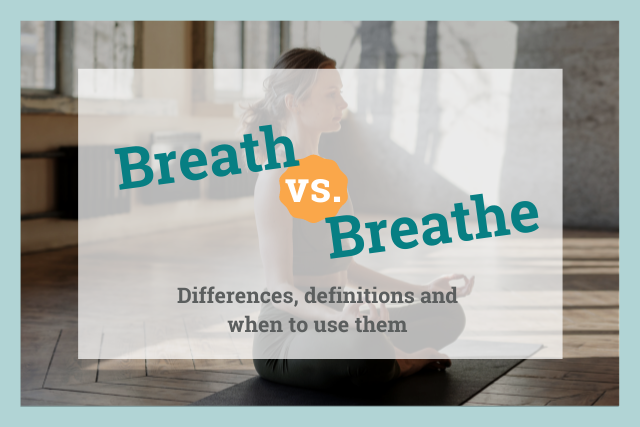
The words breath and breathe have almost identical spellings and share related meanings. Those similarities can make it difficult to know when to use which word in a sentence.
But these words play different roles in sentences, are pronounced differently, and are spelled differently. Understanding these differences will help you make the right choice.
Ready to master those differences? Take a deep breath and let’s get started!
What Does Breath Mean?
Breath is a noun. Nouns are words that represent persons, places, things, or ideas. The noun breath represents a “thing” when it is used.
Most often, we use breath to refer to the air we inhale and exhale during respiration.
For example, you might:
See your breath as a cloudy mist on a cold day
Have bad breath (I’ve got mints!)
Take a sharp, quick breath after being frightened
Take deep breaths after running a race
Hold your breath when underwater so as not to bring water into your lungs
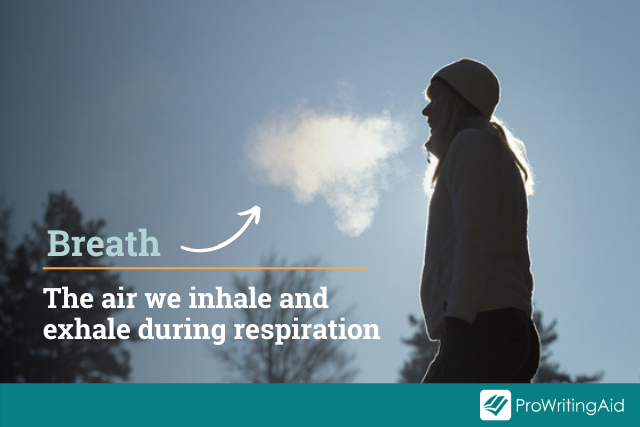
Breath can be used in other ways but is always a noun.
For example, you might:
Pause for a breath (a moment) before continuing
Detect the slightest breath (hint or indication) of wind.
What Does Breathe Mean?
Breathe, on the other hand, is a verb.
Verbs are words that show action or indicate a state of being. Breathe is a verb that conveys an action, usually the process of inhaling and exhaling.
For example, you might:
Struggle to breathe in a smoke-filled room
Breathe heavily after running a race
Learn to breathe purposefully during yoga class
Go outside to breathe in fresh air after being inside all day
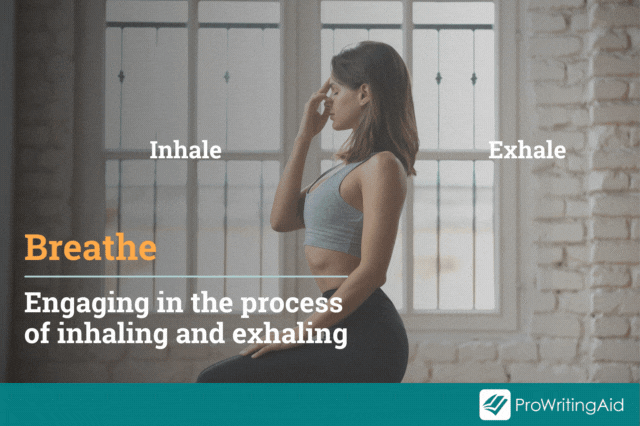
Breathe can be used in other ways, but is always a verb.
For example, you might:
Breathe in the scent of fresh bread (take in the aroma)
Open a bottle of wine to let it breathe (be exposed to open air)
Hear a secret only to be told, "don’t breathe a word of this to anyone!" (Don’t reveal even the slightest detail to anyone else)
Breath vs. Breath: How Does Each Word Sound?
Breath, the noun without the e at its end, has a short e sound.
This is the same sound you hear in the words get, set, instead, or dead.
The th at the end of breath is pronounced like the th you hear in think or teeth.
Breath rhymes with Beth and death.
Breathe, the verb with that “extra” e at the end, has the long e sound. This is the same sound you hear in the words meet or bean.
The th sound in breathe is also different. In this case, it is pronounced as the th in the words these, they, or soothe.
Breathe rhymes with seethe.
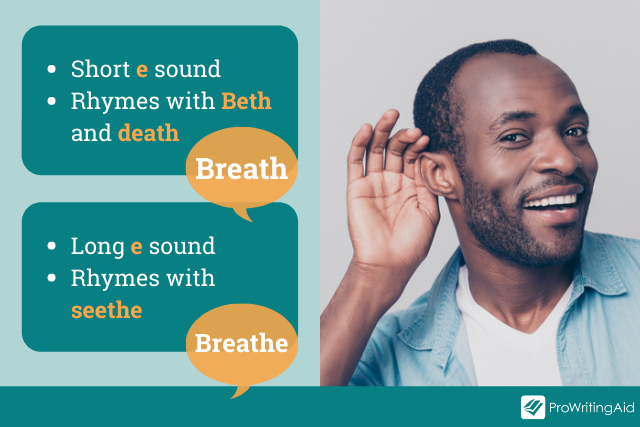
Tips to Remember How to Use, Spell, and Say Breath and Breathe
Think short for breath: breath is the shorter word—it’s “missing” that last e—and has the short e sound.
Remember this rhyme: Beth and Seth have bad breath. (Good thing I’ve got those mints!)
Consider the missing e: just as there is no e in the word noun, there is no final e in the word breath.
Think long for breathe: breathe has that “extra” letter e and has the long e sound.
Remember these sentences to help you keep the roles each word plays in a sentence clear:
- I breathe by taking breaths.
- When I breathe on a cold day, I can see my breath in the air.
Consider the extra e: just as the word Breathe has the extra e the word verb also includes an e.
How to Use the Right Word Every Time
If you're worried about using the wrong word, an editing tool can help. You'll get a reminder when you confuse similar words.
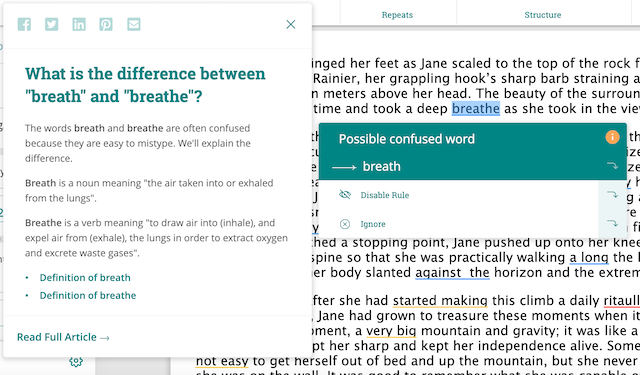
With ProWritingAid, you can also access learning resources right in the app so you can refresh your memory on the difference between words like "breath" and "breathe" as you write.
Take the stress out of writing—try ProWritingAid for free.
Different Forms of Breath and Breathe
Do you need to indicate that someone has taken more than one breath? What if you need to change the verb tense of breathe? No problem!
Check out the different forms of each of these words below so you know just how to use them.
Breath: Noun
Singular: I took one breath.
Plural: She took three breaths.
Did They “Hold Their Breath” or “Hold Their Breaths?”
Both versions can be grammatically correct, and it’s not hard to find examples of each.
An excerpt from this article from The New York Times, shows writer David W. Dunlap thought “breaths” worked best:
“The architects, engineers and city officials held their breaths.”
On the other hand, in this New York Times article, writer Melina Delkic preferred “breath:”
“People around the country held their breath waiting for the news.”
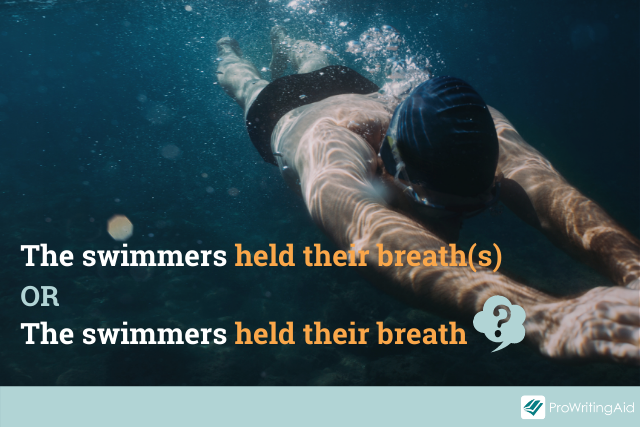
“Held their breath” is generally considered more readable and less awkward than “Held their breaths.” Of course, the context and how the word is used make a difference.
For example, if the breath/s are not being counted, it makes sense to use breath, as in:
- “They held their breath as they waited for the verdict.”
You could also say:
- “They held their collective breath as they waited for the verdict.”
However, If the breath/s are counted, then the plural option, breaths, makes more sense:
- The swimmers were instructed to count their breaths for the length of one lap.
Also, keep in mind that the pronouns “their” and “they” aren’t used just as plural pronouns anymore. They can be used to refer to a single person, which creates another time when “They held their breath” would be appropriate.
(To) Breathe: Verb
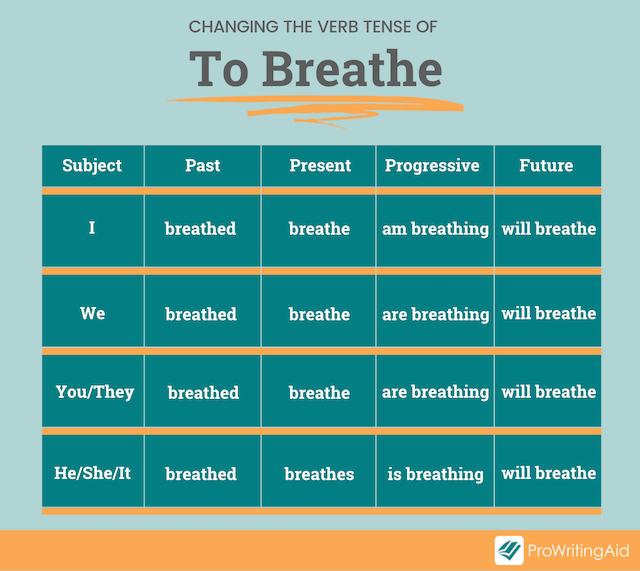
Present Tense
Singular: The boy breathes. I breathe.
Plural: The dogs breathe.
Past Tense
She breathed slowly as she slept.
After hearing the verdict, I breathed a sigh of relief.
Progressive Tense (Show action in progress)
Singular: The boy is breathing.
Plural: The cats are breathing.
Future Tense (what will happen)
He will breathe.
They will breathe.
Take the Breath/Breathe Quiz!
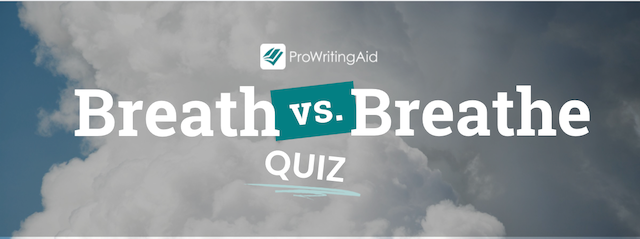
In this quiz, try to work out if you need a thing (noun) or an action (verb) to complete the sentences.
If you feel stressed, take some deep ................ to help calm your mind.
When underwater, humans cannot .................
Wait up! I need to stop and catch my .................
I can’t share a room with him. He ................ so loudly when he sleeps!
After a long day at work, I needed to take a walk and ................ the outside air.
She fogged the window with her ................ and drew her initials with her finger.
She ................ a sigh of relief when she heard the good news.
When she emerges from beneath the surface of the water, she .................
................ slowly. Take one long ................ in and one long ................ out.
I found it difficult to ................. The smoggy air was cutting off my .................
Answers:
- breaths
- breathe
- breath
- breathes
- breathe
- breath
- breathed
- will breathe
- Breathe, breath, breath
- breathe, breath.
Idioms That Include Breath or Breathe
An idiom is a phrase that has meaning to the people or culture that use it, but that meaning cannot be determined by defining its words literally. Often, people who use idioms know what the phrases mean, but don’t know why they mean what they do!
Idioms with Breath
Don’t hold your breath! (Don’t expect a result anytime soon)
Save your breath! (Don’t bother saying anything; what you say won’t matter)
I waited with bated breath! (anxiously, in suspense)
She whispered an insult under her breath. (quietly, so it couldn’t really be heard)
It took my breath away. (was stunning)
He complained about his boss but in the same breath said he loved his job. (at the same time)
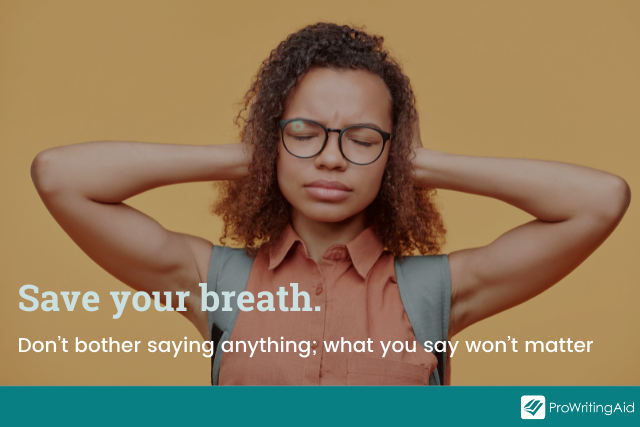
Idioms with Breathe
Why do you have to breathe down my neck? (watch or monitor me so closely?)
As I live and breathe! (I’m so surprised)
I hardly have time to breathe! (am extremely busy)
I can breathe easy now. (relax and feel calm)
She eats, sleeps, and breathes fashion. (is deeply involved with)
He was breathing fire today. (very angry)

Bonus Idiom with Breather
- Let’s take a breather (take a break)
PRO TIP: Idioms are often metaphorical, and can alienate non-native speakers. They also tend to be overused, and can make your writing feel stale.
When using idioms, think about your reader. ProWritingAid's Clichés and Redundancies Report highlights common clichés in your writing so you can make sure you're using the clearest phrasing.
To “e” or Not to “e”
While breath and breathe have six letters in common and share related meanings, their differences are what matter when it comes to using them correctly.
When you have to use breath or breathe in a sentence but aren’t certain which word is right, take a moment (breathe) and consider what you need the word to do. Do you need a noun to represent a thing or a verb to show action? Then breath it is—without the “extra” (there’s no “e” in noun)! Need a verb (spelled with an “e”)? Then breathe is the winner— add that “e!”
Of course, if you need reinforcement, ProWritingAid is always available to help!

